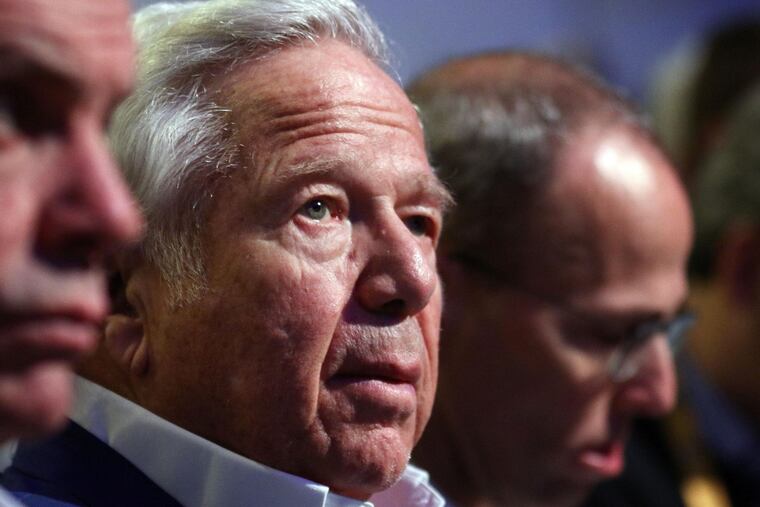Sixers partner: Robert Kraft’s legal troubles have taught him about injustices players face | Marcus Hayes
Michael Rubin, a limited partner but a very public entity, clarified his comments comparing Robert Kraft and athletes who are profiled by law enforcement.

On Tuesday, Michael Rubin stood tall at City Hall with Meek Mill and lobbied for criminal justice reform.
On Wednesday, Rubin, a limited partner of the 76ers, sat on a stage in Dana Point, Calif., and made dubious comparisons between his friend and ally, Robert Kraft -- the disgraced owner of the New England Patriots -- and the victims of the injustices he and Kraft now oppose.
Kraft is “finally seeing what it’s like to be a player in the NFL and a player in the NBA, when you have experiences with law enforcement that aren’t the way you thought they were going to be,” Rubin said.
He went on to say that Kraft drew the comparison, too:
"Rob was like, ‘Man. I get what our players go through, when they get pulled over and they are discriminated against.’ ”
Police reports indicate that Kraft, 77, was being chauffeured in January when police pulled him over after what they say was the first of two visits on consecutive days to Orchids of Asia Day Spa in Jupiter, Fla., where Kraft was allegedly seen on video soliciting sexual services.
On the face of them, Rubin’s comparisons between Kraft being caught in a massage-parlor sting and young, black men randomly being pulled over for little or no cause was, at best, insensitive; at worst, tone deaf.
Not true, Rubin said. At least, that’s not what he meant.
What he meant, he said, is that he and Kraft believe that Kraft has been unfairly treated by law enforcement, and that he and Kraft believe that any miscarriage of justice should not be tolerated. As such, Kraft can now better understand how powerless victims feel, and act upon it.
“Do I think it’s a good thing that Robert is seeing this? I do. He’ll turn a negative into a positive," Rubin told me Thursday on his way to the airport, racing back to Philadelphia for the Sixers’ game against the Bucks.
Rubin believes that Kraft now will champion criminal-justice reform with greater vigor and attention: "I truly believe, in my heart of hearts, he’ll find a way to make this country better.”
Patriots representatives did not respond to requests from The Inquirer to see whether Kraft has, in fact, experienced an epiphany.
Rubin and Kraft are the sort of friends who share vacations and professional excursions. Before Kraft’s legal troubles, Rubin hosted Kraft on the sidelines. He enlisted Kraft to join his REFORM Alliance, and doing so paid off in spades.
Last April, after a parade of sympathetic celebrities that included comedian Kevin Hart, Rockets guard James Harden, and Sixers stars Joel Embiid and Ben Simmons, Rubin brought Kraft to visit Mill at the state prison in Chester. They were acquaintances before the visit, but, after they spoke for three hours, they were good friends.
Afterward, Kraft said Mill “shouldn’t be here.”
Mill was released two weeks later. Rubin famously fetched Mill via helicopter in time for a Sixers playoff game.
Rubin, 46, is the billionaire founder of the Fanatics sports-apparel company. He became a champion of probation reform when Mill, his friend, went back to prison in 2017 for violating the terms of his parole.
Rubin went further Tuesday, accusing investigators of fabricating a human-trafficking angle in the case, which prompted the sting, and then charging Kraft based on evidence that was illegally obtained.
“You’re talking about a guy you know it’s been proven -- a month ago -- the media -- this whole thing about sex trafficking -- the whole thing was made up by law enforcement,” Rubin said. “There was no sex trafficking. It’s a lie. He was illegally videoed. He was illegally pulled over.”
Rubin is premature in his conclusions -- no determination has been made about investigators’ actions, and Kraft still faces two solicitation charges -- but Rubin was paraphrasing the 92-page court filing that Kraft’s attorney’s presented Wednesday. The product of an intense private investigation, it alleges that investigators illegally collected evidence that led to charges against Kraft and 24 other men in February.
Those charges and the aftermath, Rubin said, has given Kraft -- the man he calls his “best friend” -- a better perspective on the challenges that marginalized groups routinely face at the hands of “a criminal justice system that is fundamentally broken.”
Can Kraft be counted on to help fix it?